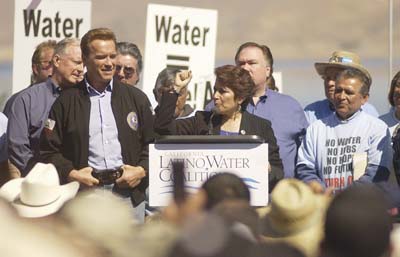
Assemblywoman Anna Caballero is authoring an $11.7 billion water
bond to fund a range of projects, including efforts to solve the
shortage problem associated with drought conditions and
environmentalists’ efforts to save the threatened Delta smelt.
Caballero described the proposal as including funding
– the length of the bond and methods of appropriation are being
left for negotiations among legislators, she said – for a wide
range of water projects.
HOLLISTER
Assemblywoman Anna Caballero is authoring an $11.7 billion water bond to fund a range of projects, including efforts to solve the shortage problem associated with drought conditions and environmentalists’ efforts to save the threatened Delta smelt.
Caballero described the proposal as including funding – the length of the bond and methods of appropriation are being left for negotiations among legislators, she said – for a wide range of water projects.
They include allocating money to “every single watershed” in the state; setting aside $3 billion for Delta repairs; using another $3 billion on storage; and using other funds for conservation, groundwater contamination cleanup, recycling, storm runoff and desalination, among other needs, she noted.
Caballero pointed out that she became active in the effort to fund water improvements about a year and a half ago when Latino leaders started an aggressive campaign in favor of more pumping.
There are two primary causes to the shortage. A federal judge prohibited pumping into reservoirs during particularly dry months due to the endangered, two-inch Delta smelt fish. And the federal allocation of water this year, which had been zero at the outset, is just 10 percent of normal capacity.
Though the problem is immense and has lasting impacts on the state’s agricultural economy, it also carries a hefty price tag – about half of the operating deficit California leaders are trying to close through widespread cuts to social programs, education and just everything in between, along with increased taxes and fees for residents.
“When you have over 100,000 acres that are put out of production and hundreds of farmers not producing, and thousands of farmworkers unemployed or partially employed, that’s a crisis,” she said.
The proposal, not yet in bill draft form, has what the local state assemblywoman described as bipartisan support. Caballero spoke out in support of the proposal Wednesday in front of the Senate Select Committee on Delta Stewardship and Sustainability.
But it already has its share of critics as well. Sen. Jeff Denham, the Atwater Republican who represents San Benito County, this week released a statement saying the “political games need to stop.” Denham criticized the proposal because it lacks continuous appropriation for surface water storage facilities, the closest major one to Hollister being San Luis Reservoir.
“I will not support any water bond measure that does not guarantee funding (continuous appropriation) for surface water storage facilities …” noted Denham in the statement, which adds how the senator supported a water bond measure in the 2005-06 session that would have helped fund such surface water storage.
Caballero also acknowledged she might have problems gaining support within her own party, especially on the heels of such massive cuts to many programs traditionally supported by Democrats.
“There are differing opinions as to whether we should be doing a bond at this time,” she said. “There are some concerned that, given the financial health of the state, it’s not a good time to do a bond, and I understand that. We’re in the middle of a tremendous recession. But we have a system in collapse.”
Given the stakes, authors of the bill are leaving out a time frame and appropriation methods so they can be hashed over in talks among legislators.
“It’s blank,” Caballero said. “It’s blank for a purpose. If we’re going to have Republicans and Democrats agree on a bond, we’re going to have to negotiate that blank face.”
One certainty is that the proposed projects would raise taxes for residents, which she acknowledged. As for the level of financial impact for users, she said it’s too early to tell.
“We’re not even talking about numbers yet,” she said. “We’re talking about how it would work.”
The proposal also comes a year after state leaders rejected a $9.8 billion water bond proposal. Now, she said, there is a “recognition that the drought had become much more severe than anybody thought it would be.”
Look for local implications and reaction to this story in Tuesday’s edition of the Free Lance.








